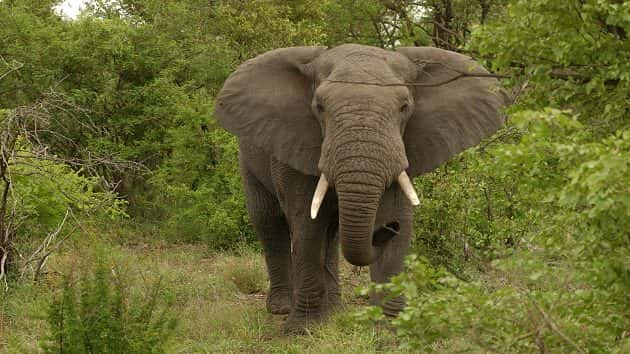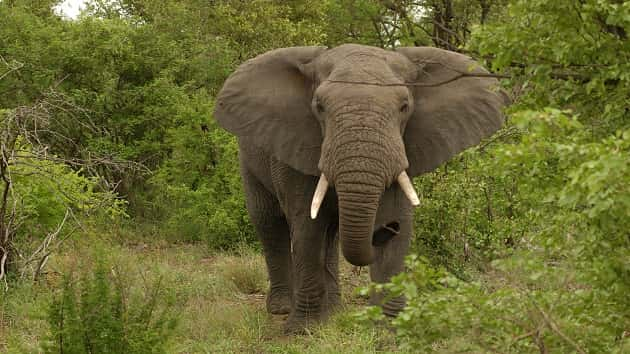
Ingram/Thinkstock
 Ingram/Thinkstock(HARARE, Zimbabwe) — The Trump administration will start accepting permits for hunters to bring trophies from elephants hunted in Zimbabwe and Zambia into the United States, saying that new information shows that the practice of trophy hunting actually helps the survival of the endangered species in the wild.
Ingram/Thinkstock(HARARE, Zimbabwe) — The Trump administration will start accepting permits for hunters to bring trophies from elephants hunted in Zimbabwe and Zambia into the United States, saying that new information shows that the practice of trophy hunting actually helps the survival of the endangered species in the wild.
The U.S. Fish and Wildlife Service and hunting advocates say that hunting big animals like elephants and lions brings in money that countries use for conservation and anti-poaching programs and that wildlife authorities in Zimbabwe provided enough information to support reversing the 2014 ban.
“The Service will continue to monitor the status of the elephant population, the management program for elephants in the country to ensure that the program is promoting the conservation of the species, and whether the participation of U.S. hunters in the program provides a clear benefit to the species,” U.S. Fish and Wildlife says in the official notice.
The announcement that U.S. Fish and Wildlife would start granting permits to import elephant trophies again was made by U.S. officials at a conservation conference in Tanzania hosted by Safari Club International, a hunting and conservation advocacy group.
“These positive findings for Zimbabwe and Zambia demonstrate that the Fish and Wildlife Service recognizes that hunting is beneficial to wildlife and that these range countries know how to manage their elephant populations,” said the organization’s president, Paul Babaz in a Safari Club blog post.“We appreciate the efforts of the Service and the U.S. Department of the Interior to remove barriers to sustainable use conservation for African wildlife.”
The Safari Club filed a lawsuit with the National Rifle Association of America to block the ban on elephant trophy imports when it was announced in 2014, according to the blog post.
Hunting excursions in Zimbabwe can cost more than $37,000 and hunters also have to pay up to $14,500 for each elephant killed, according to safari hunting websites. A portion of the cost of a hunting trip led by guides includes goes to that country’s government to be used for conservation. The ivory from an elephant’s tusks is estimated to be worth $21,000.
Another argument in favor of trophy hunting is that allowing people to hunt animals makes them more valuable and gives local farmers or land owners a reason to care for them.
In 2015 Melville Saayman, a tourism and economics professor from North-West University in South Africa wrote that wildlife populations actually increased in countries that allow hunting like South Africa and Namibia and face more threats from poaching in areas where hunting is not allowed.
“From a conservation point of view wildlife is not doing well and one of the reasons for this is because hunting creates huge value. People protect what is valuable to them. And if hunting helps them get money and other goods from the animal, it is certainly in their best interests to look after the animals,” Saayman wrote.
But conservation advocates say that elephants bring in much more revenue from tourists who want to see them alive. A report from the David Sheldrick Wildlife Trust estimates that an elephant brings in $23,000 a year, or $1.6 million over its lifetime.
Animal advocates also say that hunting endangered species is unethical and shouldn’t be used to generate money for the government.
“It’s impossible to sustainably harvest a species that’s declining,” Sebastian Troeng, executive vice president of Conservation International said. “The notion that killing elephants is helping elephants doesn’t hold water,”
Wayne Pacelle, president of the Humane Society of United States, says using conservation to support hunting doesn’t make any sense because people travel to these countries to see live animals in the wild.
“You shouldn’t be conducting unethical activities to create commerce,” Pacelle said Thursday, adding that other countries like Kenya have banned sports hunting completely.
He also said that he thinks the argument that money from hunting is used for conservation doesn’t hold up, giving the example that Zimbabwe’s government has struggled with corruption for years and is in the middle of a volatile political situation.
“It’s laughable to think that somehow they have strict controls in Zimbabwe,” Pacelle said.
Savanna elephant populations declined by 30 percent across 18 countries in Africa from 2007 to 2014, according to the Great Elephant Census published last year, which put their remaining numbers at just over 350,000.
The elephant population declined 6 percent overall in Zimbabwe but dropped by 74 percent within one specific region. Elephants saw “substantial declines along the Zambezi River,” in Zambia while other areas of that country were stable, according to the census.
Copyright © 2017, ABC Radio. All rights reserved.


